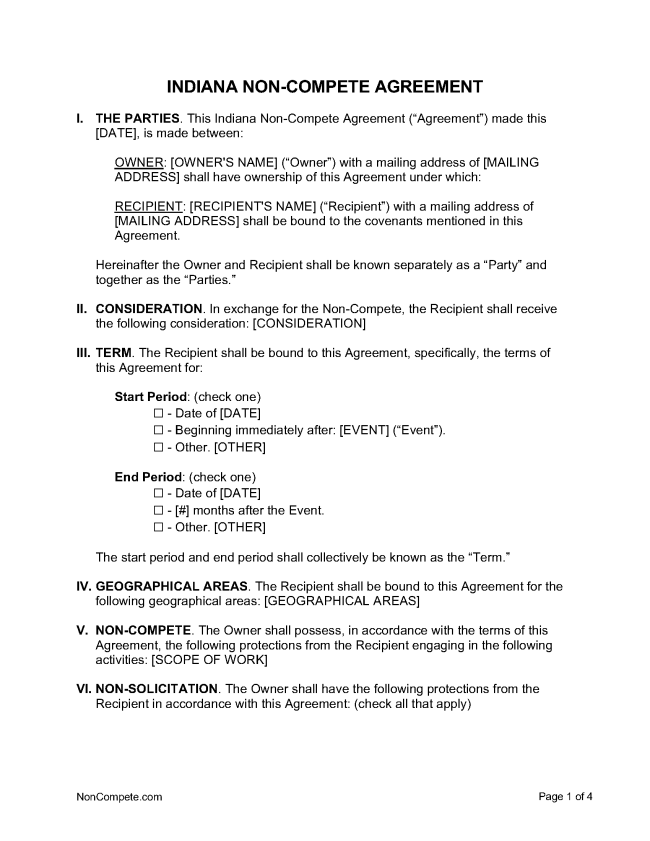An Indiana non-compete agreement is a set of contractual terms that prevents a person or persons from engaging in specific commercial activity. Non-compete agreements are also commonly called “covenants not to compete.” In Indiana, they are generally disfavored by courts. However, non-competes that arise through the sale of a business are looked on much more favorably than those coming through an employment contract.
Table of Contents |
Are Non-Competes Enforceable in Indiana?
Yes, if they are reasonable. (Zollinger v. Wagner-Meinert Engineering, LLC (2020))
Whether a non-compete agreement is considered reasonable, however, depends on whether it is part of an employment agreement or part of the sale of a business. Courts are skeptical about enforcing non-competes in employment agreements but more accepting in the context of selling a business. (Dicen v. New Sesco (2005)).
Sale of Business vs. Employment Agreement
Suppose a non-compete is contained within an employment agreement created as part of the same transaction, the sale of a business. In that case, that non-compete agreement is evaluated under the more forgiving standard. (Dicen v. New Sesco (2005)).
Reasonableness
Non-compete agreements must be reasonable for both parties and the general public. (Norlund v. Faust (1997))
There are two steps to determine whether a covenant not to compete found will be considered reasonable:
- Has the employer identified a legitimate protectable business interest? If so,
- Is it reasonable regarding the duration, geographic reach, and activity prohibited?
Legitimate Protectable Interest
Good will is a legitimate interest that may be protected through non-compete agreements in Indiana. Good will can include the names and addresses of customers and the relationship built up with those customers through contact during time spent with the employer. (Unger v. FFW Corp. (2002))
Trade secrets and confidential information are legitimate protectable interests. Still, the potential use of knowledge or skill acquired on the job, and the use of non-confidential information, cannot justify a non-compete agreement. (Licocci v. Cardinal Associates, Inc. (1983))
Prohibited Activity
A non-compete agreement cannot be so broad that it prevents a former employee from competing with parts of the business with which the employee never had contact. (Seach v. Richards, Dieterle & Co. (1982))
Non-compete agreements prohibiting conduct beyond what is necessary to protect the employer’s legitimate interest are unenforceable. (MacGill v. Reid (2006)).
Professions
Non-compete agreements involving physicians are not automatically void; they are subject to the same reasonableness standards as other fields. (Central Indiana Podiatry v. Krueger (2008))
Employment contracts or partnership agreements that limit an attorney’s right to practice in the future, except for agreements concerning retirement benefits, are not enforceable. Rule 5.6, Indiana Rules of Professional Conduct.
Attorneys cannot settle a case in a way that restricts their ability to represent a client. Rule 5.6, Indiana Rules of Professional Conduct.
Terminating an Employee
A non-compete agreement is likely not enforceable if the employer commits a material breach of the employment contract. Terminating an employee is not necessarily a qualifying material breach. In Unger v. FFW Corp. (2002), an employee was let go before the minimum on the last date of employment and did not receive a bonus but was still paid a salary. The Indiana Court of Appeals held the agreement was enforceable but also ruled that the employee was not technically terminated.
Burden of Proof
The employer has the burden of showing that a non-compete agreement is (1) reasonable and (2) necessary in light of the circumstances. (Pathfinder Communications Corp. v. Macy (2003))
Continued Employment (consideration)
A promise to continue at-will employment is sufficient consideration to support a non-compete agreement. (Ackerman v. Kimball Intern. (1995))
Maximum Term
There is no maximum term for non-compete agreements, and the amount of time may depend on how broad the geographic limitation is. Still, an agreement with no time limit is automatically invalid. (Harvest Insurance Agency v. Inter-Ocean Insurance Co. (1986))
An agreement lasting three years was enforced when it covered a salesman restricted from competing only in the counties where he had previously worked. (4408, Inc. v. Losure (1978))
For a non-compete agreement in the sale of a business, a three-year prohibition on competing in any of twelve states has been allowed. (Fogle v. Shah (1989))
Blue Penciling (allowed)
If part of a non-compete agreement is considered excessive, and it’s possible to get rid of the term and still have the rest of the agreement make sense, then courts can get rid of the offending term and enforce the rest of the agreement. (Seach v. Richards, Dieterle & Co. (1982))
